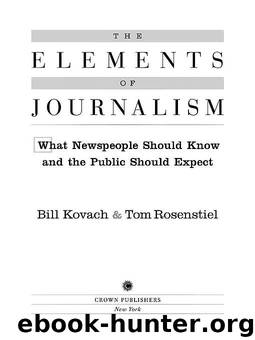The Elements of Journalism: What Newspeople Should Know and the Public Should Expect by Rosenstiel Tom & Kovach Bill

Author:Rosenstiel, Tom & Kovach, Bill [Rosenstiel, Tom]
Language: eng
Format: mobi
Publisher: Three Rivers Press
Published: 2001-07-23T16:00:00+00:00
INDEPENDENCE FROM RACE, ETHNICITY, RELIGION, AND GENDER. The last thirty years has seen a growing awareness of the need for reflecting the diversity of American society in the newsroom. Trade groups such as the American Society of Newspaper Editors have created industrywide diversity goals for newspapers. Various news organizations have revamped their style books to root out racist language. To date, however, the newspaper industry has failed to meet the goals. As we will outline in discussing the principle of personal conscience, there are problems with the concept of diversity if it is narrowed simply to mean ethnic, gender, or other numerical targets. Those are a necessary means, but they should not be the goal of diversity.
Yet there is another issue within the question of diversity that must be wrestled with first. It is the question of the degree to which ethnicity and gender can be equated with identity or expertise. Do we think that only African-Americans can capably cover African-Americans, or Asian-Americans alone capably cover Asian-Americans, and so on? Shouldn’t a good journalist be able to cover anything?
“The argument for diversity based on representation . . . at its core, presupposes that persons of the same race and gender think alike because of their shared experiences of racism and sexism,” says African-American business executive Peter Bell. “The argument, I believe, ignores and/or minimizes the influence of class, education, region, family, personal psychology and religion in shaping our personal ideas and beliefs. . . . Observable traits such as race and gender . . . serve as a proxy, and I would argue a crude proxy, for ideas. . . . What is the black position on any given issue? The answer, of course, is there isn’t one.”13
Many journalists, even those in minority groups, have similar doubts. “To simply say . . . that you’re going to have an Asian and a black and a person in a wheelchair in your newsroom, and that this is somehow going to give you some license to say that you’re diverse, is to fall into the same category of determining your content on the basis of demographics,” says NBC News correspondent John Hockenberry, who is disabled. “You can determine revenue on the basis of demographics, but you can never determine content. . . . Far from hiring in the newsroom being an indicator of where diversity comes from, it’s knowing your audience, and to be truly interested in your audience from the top to the bottom, from the left to the right, and from all economic levels.”14
The criticisms touch a serious point: To what extent does background influence a journalist’s work? If an editor determines who covers what simply by ethnic heritage or skin color, isn’t that just another kind of racial and ethnic stereotyping? It implies that there is such a thing as a single black perspective or a single Asian perspective.
Somewhere between rigid newsroom quotas and the fears of a new “politically correct” orthodoxy lies a richer area. There is already ample evidence that newsrooms lacking diversity are unable to do their jobs properly.
Download
This site does not store any files on its server. We only index and link to content provided by other sites. Please contact the content providers to delete copyright contents if any and email us, we'll remove relevant links or contents immediately.
Asking the Right Questions: A Guide to Critical Thinking by M. Neil Browne & Stuart M. Keeley(5761)
Autoboyography by Christina Lauren(5228)
Eat That Frog! by Brian Tracy(4526)
Dialogue by Robert McKee(4389)
Sticky Fingers by Joe Hagan(4188)
Journeys Out of the Body by Robert Monroe(3615)
Annapurna by Maurice Herzog(3464)
Full Circle by Michael Palin(3443)
Schaum's Quick Guide to Writing Great Short Stories by Margaret Lucke(3375)
Elements of Style 2017 by Richard De A'Morelli(3343)
The Art of Dramatic Writing: Its Basis in the Creative Interpretation of Human Motives by Egri Lajos(3061)
Atlas Obscura by Joshua Foer(2955)
Why I Write by George Orwell(2945)
The Fight by Norman Mailer(2930)
The Diviners by Libba Bray(2927)
In Patagonia by Bruce Chatwin(2922)
The Mental Game of Writing: How to Overcome Obstacles, Stay Creative and Productive, and Free Your Mind for Success by James Scott Bell(2899)
Venice by Jan Morris(2568)
The Elements of Style by William Strunk and E. B. White(2470)
